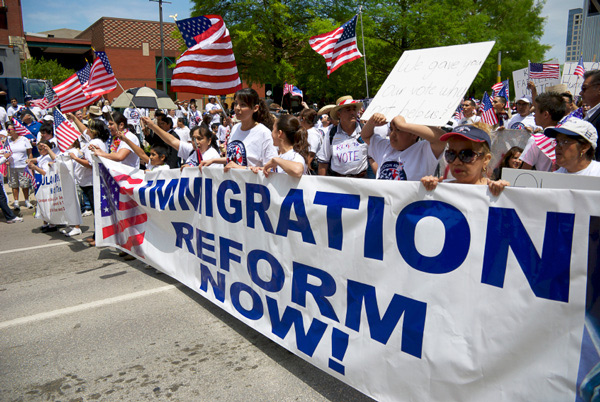
The Supreme Court announced Tuesday that it will take up a case challenging the legality of President Barack Obama’s executive actions aimed at granting quasi-legal status and work permits to up to five million people who entered the U.S. illegally as children or who have children who are American citizens.
The high court’s widely-expected move gives Obama a chance to revive a key legacy item that has been in limbo for nearly a year, since a federal judge in Texas issued an order halting immigration moves the president announced just after the 2014 midterm elections.
The justices are expected to hear arguments on the issue in April and to hand down a ruling by the end of June. Illegal immigration has already been a hot topic in the presidential contest, but the high-profile attention brought on by the Supreme Court fight could amp up the debate even further as the campaign plays out this spring and summer.
If the court rules in Obama’s favor, his administration will have a relatively short, seven-month window to try to roll out the expanded Deferred Action for Childhood Arrivals program and the new initiative called Deferred Action for Parents of Americans. While advocacy groups are eager to have illegal immigrants apply for the programs, there are questions about how many will do so if they’re debuted or expanded so close to the end of Obama’s presidency.
The calculation of whether to apply may depend, in part, on the state of the presidential race and whether whoever is atop the field seems likely to continue Obama’s policies. Since the moves are executive actions, they could be quickly rescinded and most of the major Republican candidates have pledged to do just that.
The lawsuit the justices agreed to hear was brought by Texas and 25 other states claiming they would be harmed by Obama’s executive actions.
In February, Brownsville, Tex.-based U.S. District Court Judge Andrew Hanen issued an injunction barring the Department of Homeland Security from moving forward with the DAPA and expanded DACA programs. Hanen suggested Obama lacked the legal power to undertake such vast changes in the immigration landscape without congressional involvement, but the judge based his ruling on the narrower, more technical ground that the changes were never formally proposed as regulations and put through the public-notice-and-comment process under federal law.
In November, the 5th Circuit U.S. Court of Appeals refused to disturb Hanen’s nationwide injunction. The 2-1 decision actually went further than the lower court ruling and held Obama’s actions unlawful.
Later that month, the Justice Department asked the justices to take up the case.
Neither the lawsuit nor the injunction directly involve the first version of the DACA program for so-called Dreamers that Obama set up in 2012. However, if the Supreme Court holds Obama did not have authority for his more expansive moves in 2014, the administration would likely have to shut down the earlier program, which has granted quasi-legal status and work permits to about 788,000 people.



Expositores: Oscar Vidarte (PUCP) Fernando González Vigil (Universidad del Pacífico) Inscripciones aquí. Leer más
Una retrospectiva para entender los próximos cuatro años. Leer más
En la conferencia se hará una presentación de los temas más relevantes del proceso de negociación se llevó a cabo desde el 2012, así como del acuerdo de paz firmado entre el Gobierno colombiano y la guerrilla de las FARC a finales del 2016. Se analizarán los desafíos y las... Leer más
El Observatorio de las Relaciones Peruano-Norteamericanas (ORPN) de la Universidad del Pacífico es un programa encargado de analizar y difundir información relevante sobre la situación política, económica y social de Estados Unidos y analizar, desde una perspectiva multidisciplinaria, su efecto en las relaciones bilaterales con el Perú.
© 2026 Universidad del Pacífico - Departamento Académico de Humanidades. Todos los derechos reservados.

